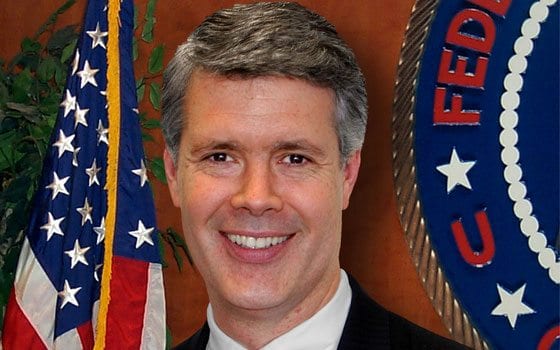
Robert M. McDowell, one of the five commissioners that head the Federal Communications Commission (FCC), conducted a town hall meeting at Emerson College last Thursday as part of a nationwide tour to inform the public about the upcoming transition to digital television on Feb. 17, 2009.
In 2005, Congress passed the Digital Television Transition and Public Safety Act, which requires that broadcasters stop transmitting the programming of their full-power television stations through analog signals as of next year. Instead, broadcasters must use newer digital technology.
The government and broadcasters have stepped up advertising about the change as the deadline approaches, and McDowell told the Emerson audience that efforts to increase awareness of the switch would continue.
“We are working to get the word out about the digital transition,” McDowell said. “Once the conversion happens, people will see all the benefits of the transition.”
The benefits for viewers, according to McDowell, include improved picture and sound quality, increased programming choices and advanced wireless services. Most important, he added, the transition will free up a range of broadcast frequencies to be used for both commercial and public safety purposes, such as police, fire and emergency rescue communications.
But to access those benefits, viewers will have to be prepared for the changeover to digital television — and observers say that many African Americans aren’t ready.
According to a recent Nielsen survey, 12.5 percent of African American television-watching households are completely unprepared for the switch. Viewers in these homes still watch television on an analog set with an antenna or rabbit ears, are not plugged into a digital service like cable or satellite television and have not purchased a digital converter box.
In a tough economy, finances are also a factor in readiness for the switch. According to Nielsen, more than 75 percent of completely unready American households had annual incomes of less than $50,000.
The media research company’s data also show that African Americans continue to watch more television than any other ethnic group, averaging 45 hours and 22 minutes of television viewing per week. Average viewing among all households was 31 hours and 55 minutes per week; in Hispanic households, the average amount was 27 hours and 13 minutes.
McDowell said the FCC is collaborating with a number of organizations and community groups around the country to reach those who will be most affected by the transition, including communities of color.
Seeking to address the switch here in Boston, Mayor Thomas M. Menino joined the FCC-Mayors Digital Television Initiative, which focuses on helping those who will be disproportionately affected by the transition. The city’s Cable Office estimates that the number of Boston households using off-air reception for television viewing could be as high as 90,000; between 55 percent and 60 percent of Boston households subscribe to cable service and only about 5 percent use satellite, meaning about one-third of households that now receive over-the-air broadcasts on their TVs will have to get ready for the change.
Karen Holmes Ward, director of public affairs and community benefits for WCVB-TV, said that she has been spending the past few weeks speaking to community groups and making sure new information about the digital transition is updated on the channel’s Web site.
“This is not a sexy topic,” she said. “Most people will not realize the true impact until they see that something is wrong with their televisions in February. This transition is going to affect many in our community.”
Television owners in danger of losing their access in the transition have three options to keep them plugged in. They can subscribe to a paid and ready television service, like cable or satellite; buy a television set with a built-in digital tuner; or connect their current set to a digital-to-analog converter box, which generally cost between $40 and $70. The U.S. government has set up a budget, offering each household two $40 coupons to use toward purchasing the converter boxes. The coupons can be redeemed online at www.dtv2009.gov, or by calling 1-888-388-2009.
McDowell strongly recommended that those who need to purchase a converter to transition their sets not wait until the last minute to redeem coupons, as the coupon-processing procedure can take up to four to six weeks to complete for each household.
“Television owners don’t have to wait until February to view programming in digital; they can do it now,” he said. “Furthermore, it is best to look into dealing with the transition now so you can deal with any unexpected problems before it’s too late.”
James Broadnax, of the Boston branch of the NAACP, said that he goes around to senior citizen centers in Roxbury to help residents with their televisions.
He said many of the seniors are having problems because many of them don’t have the know-how to update their televisions, and the instructions on www.dtv2009.gov are not easy to read.
“Some of the senior centers I have been to are not sure if the antenna is connected to the TV,” Broadnax said. “There seems to be a lot of outreach from the FCC, but clearly they still have a lot of work cut out for them.”






